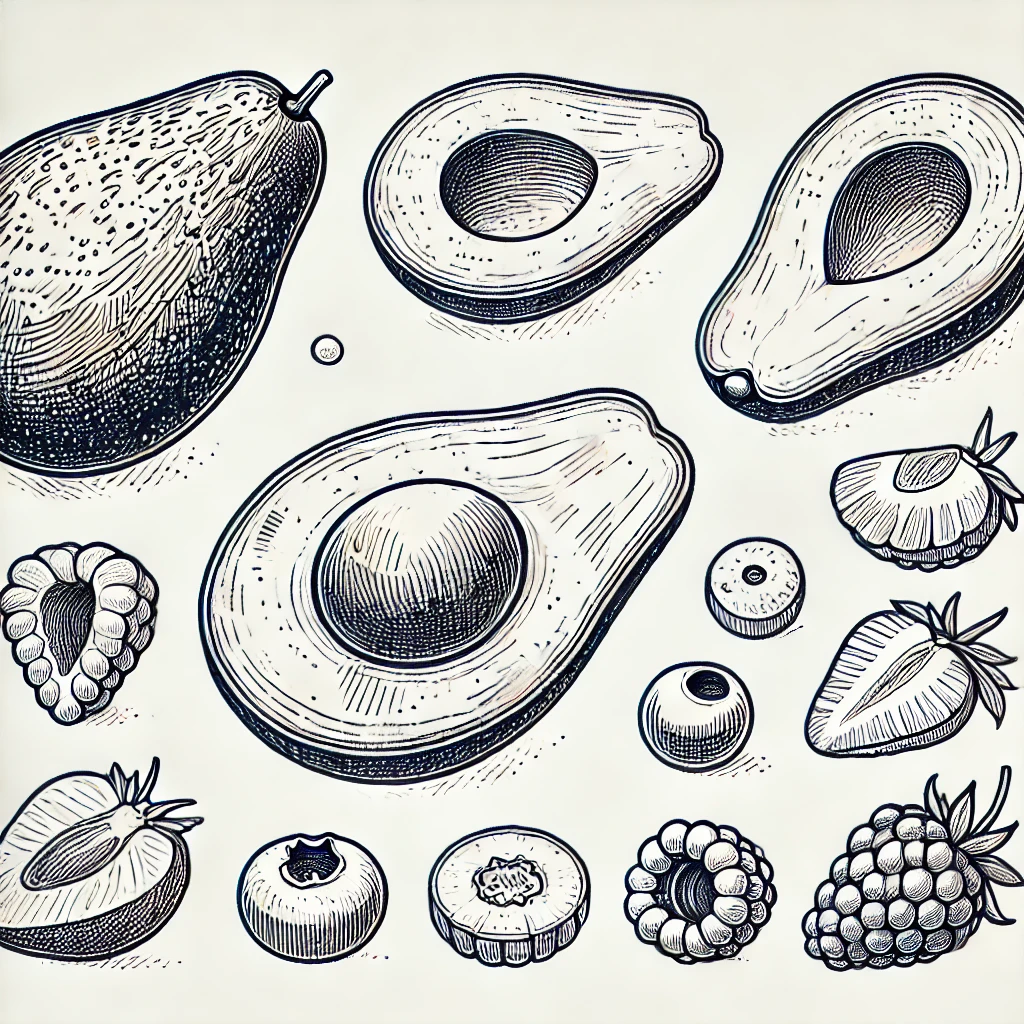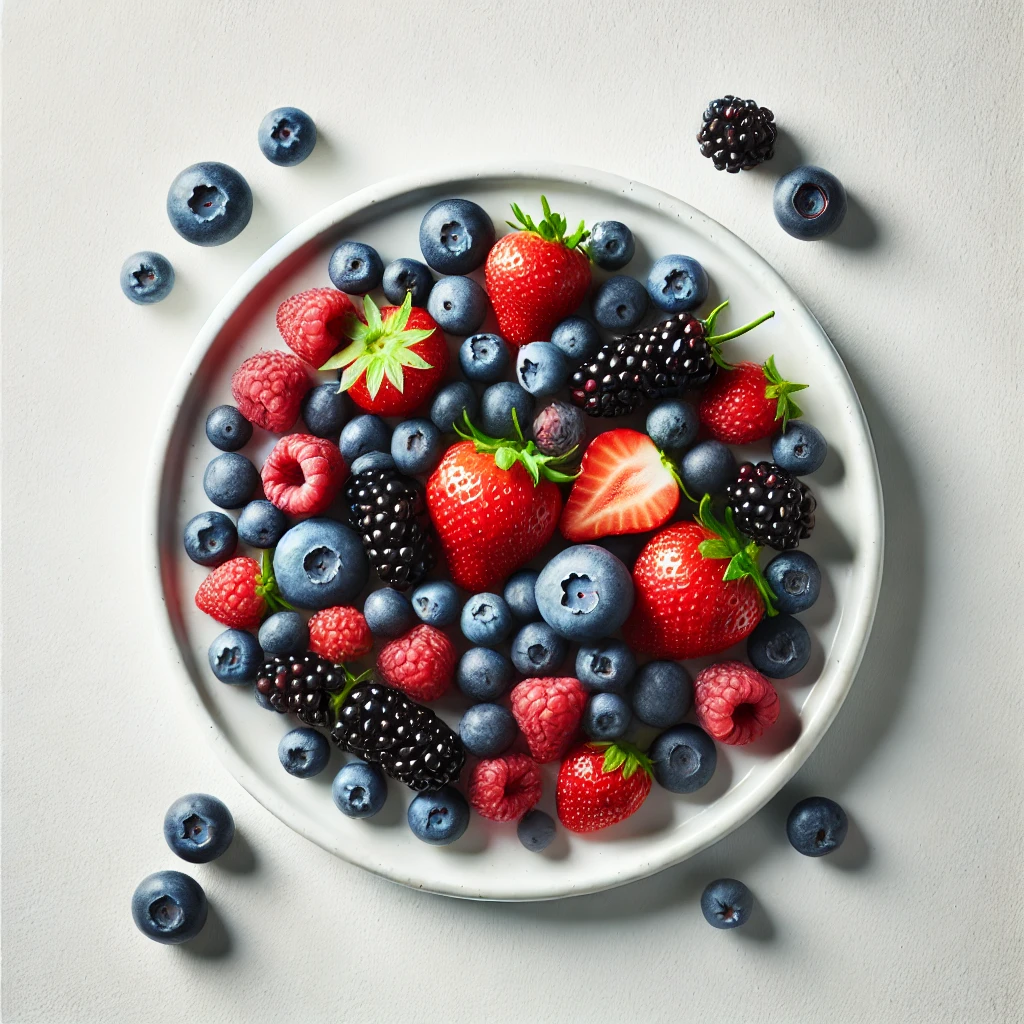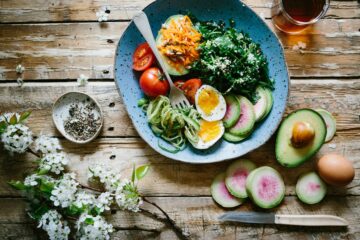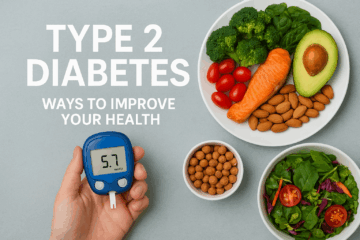Healthy eating is not about strict dietary limitations, staying unrealistically thin, or depriving yourself of the foods you love. It’s about improving your health, boosting energy, and feeling your best. In this blog, we’ll dive into what it means to eat healthily, what a balanced diet looks like, and explore some of the healthiest foods. Finally, we’ll end with a delicious recipe for the healthiest breakfast.
What Is Healthy Eating?
Healthy eating means consuming a variety of nutrient-rich foods in the right quantities to support your overall well-being. It’s about balance, choosing foods that nourish your body and keep it functioning optimally. Healthy eating also involves mindful habits such as portion control and listening to your body’s hunger and when it tells you, you’ve had enough food.
10 Healthy Foods to Eat Regularly
Here are ten nutrient-packed foods that can help boost your health:
- Leafy Greens (e.g., spinach, kale): Rich in vitamins, minerals, and antioxidants, leafy greens help support heart health, bone strength, and the immune system.
- Berries (e.g., blueberries, strawberries): High in fiber and antioxidants, they can help reduce inflammation and improve digestion.
- Nuts and Seeds (e.g., almonds, chia seeds): Packed with healthy fats, fiber, and protein, nuts and seeds support brain health and heart function.
- Whole Grains (e.g., quinoa, brown rice): Rich in fiber and nutrients, whole grains help improve digestion and maintain steady blood sugar levels.
- Oily Fish (e.g., salmon, mackerel): Loaded with omega-3 fatty acids, which support heart health and reduce inflammation.
- Legumes (e.g., lentils, chickpeas): Excellent plant-based sources of protein and fiber, legumes help maintain healthy blood sugar and cholesterol levels.
- Avocados: High in heart-healthy fats and fiber, avocados support digestion and are rich in potassium and vitamin C.
- Eggs: A fantastic source of high-quality protein, vitamins, and minerals, eggs are great for muscle repair and brain function.
- Sweet Potatoes: Full of vitamins A and C, fiber, and antioxidants, sweet potatoes help support immune function and skin health.
- Yogurt (preferably Greek yogurt): Rich in probiotics, protein, and calcium, yogurt helps with digestion and supports bone health.

What Is a Balanced Diet?
A balanced diet provides the nutrients your body needs to function correctly and keep you going. To get the proper nutrition from your diet, you should consume most of your daily calories in:
- Fresh fruits and vegetables
- Whole grains
- Legumes and nuts
- Lean proteins
- Healthy fats
7 Essentials for a Balanced Diet
- Proteins: Necessary for muscle growth and repair, enzymes, and hormones. Lean meat, fish (tuna, salmon), legumes, eggs, and plant-based proteins are ideal.
- Carbohydrates: Your body’s main source of energy. Choose complex carbs like whole grains, fruits, and vegetables.
- Fats: Essential for brain function, cell health, and energy. Opt for healthy fats from avocados, nuts, seeds, and oily fish.
- Vitamins: Needed for a wide range of bodily functions. Fresh fruits, vegetables, and fortified foods provide a rich variety of vitamins.
- Minerals: Help maintain bone strength, nerve function, and more. Sources include vegetables, lean proteins, and dairy.
- Fiber: Crucial for digestion and maintaining steady blood sugar. Whole grains, fruits, vegetables, and legumes are fiber-rich.
- Water: Essential for hydration, digestion, and all bodily functions. Aim for 8 glasses a day or more, depending on your activity level.
Best Snacks for Energy?
For sustained energy throughout the day, opt for snacks that balance protein, healthy fats, and complex carbohydrates. These snacks help keep your blood sugar levels steady, avoid energy crashes, and provide essential nutrients that fuel your body and mind. Whether you’re at work, after a workout, or on the go, these healthy snack ideas will keep you energized and satisfied!
When you need a quick boost of energy, it’s important to reach for snacks that are nutrient-dense and provide a good balance of protein, healthy fats, and complex carbohydrates. Here are some of the best snacks for sustained energy:
1. Nuts and Seeds
Nuts like almonds, walnuts, and cashews are rich in protein, healthy fats, and fiber, all of which provide lasting energy. Seeds like chia, flax, and pumpkin seeds are also great for sustained energy due to their high omega-3 fatty acid content.
Nuts and seeds available on Amazon
- Pro tip: Pair with dried fruit like raisins or apricots for a balanced snack.
2. Greek Yogurt with Berries
Greek yogurt is packed with protein, and berries add fiber, antioxidants, and natural sweetness. This combination keeps your blood sugar stable and provides lasting energy.
- Pro tip: Add a drizzle of honey or a sprinkle of granola for an extra crunch.
3. Hummus and Veggies
Hummus, made from chickpeas, is high in protein and healthy fats, while veggies like carrots, cucumbers, and bell peppers offer fiber, vitamins, and minerals for sustained energy.
- Pro tip: Swap traditional hummus for a variety like red pepper or edamame hummus for more flavor.
4. Apple Slices with Nut Butter
The combination of natural sugars in apples and the healthy fats and protein in nut butter (such as almond or peanut butter) makes this snack a perfect energy booster. The fiber in apples helps slow down the digestion of sugar, keeping your energy levels steady.
- Pro tip: Sprinkle cinnamon or chia seeds on top for extra nutrition.
5. Trail Mix
A homemade trail mix with nuts, seeds, dried fruits, and a small portion of dark chocolate is a great portable snack. The combination of complex carbs, fats, and protein helps you maintain energy over time.
- Pro tip: Avoid store-bought trail mixes with added sugars; instead, make your own for a healthier option.
6. Oatmeal Energy Balls
These no-bake snacks made from oats, nut butter, honey, and seeds offer long-lasting energy thanks to their combination of complex carbohydrates, fiber, and healthy fats.
- Pro tip: Add ingredients like coconut flakes, dried fruit, or chia seeds for extra texture and flavor.
7. Hard-Boiled Eggs
Eggs are an excellent source of high-quality protein and healthy fats, making them an ideal snack to keep you full and energized.
- Pro tip: Pair a hard-boiled egg with whole-grain crackers or sliced veggies for a more balanced snack.
8. Cottage Cheese and Pineapple
Cottage cheese is high in protein and calcium, while pineapple provides natural sugars and vitamin C for an energy boost. This combo is refreshing and light but still filling.
- Pro tip: Opt for low-fat or full-fat cottage cheese for more satiation and flavor.
9. Energy Bars
Opt for energy bars made from whole ingredients like oats, nuts, seeds, and dried fruits. Look for bars low in added sugars and high in protein and fiber for steady energy.
Choice of Energy Bars available on Amazon
- Pro tip: Brands like RXBAR, Lara Bar, and KIND bars are good options with minimal processed ingredients.
10. Banana with Peanut Butter
Bananas provide quick-acting carbs for a fast energy boost, while peanut butter adds protein and healthy fats to sustain that energy over time.
- Pro tip: For extra texture and nutrition, top the banana with chia seeds or cacao nibs.
11. Edamame
These protein-rich soybeans are an excellent snack for sustained energy. They’re also high in fiber and important nutrients like iron and magnesium.
- Pro tip: Steam and season with a little sea salt or chili flakes for added flavor.
12. Avocado on Whole-Grain Crackers
Avocados are rich in healthy monounsaturated fats, and when paired with whole-grain crackers, you get the added benefit of fiber and complex carbs to keep energy levels high.
- Pro tip: Sprinkle a little sea salt and lemon juice on the avocado for a zesty twist.
13. Dark Chocolate and Almonds
Dark chocolate contains a small amount of caffeine, while almonds provide protein and healthy fats. This combination gives you a quick energy lift and keeps you satisfied.
Dark Chocolate direct from Amazon
- Pro tip: Choose dark chocolate with at least 70% cocoa content for the most health benefits.
14. Smoothie with Protein
A smoothie made with fruits, leafy greens, and a protein source like Greek yogurt or protein powder can provide a quick and balanced energy boost. Add a handful of oats or chia seeds for additional fiber and longer-lasting energy.
- Pro tip: Blend with almond milk or coconut water for added hydration.
15. Tuna and Whole-Grain Crackers
Tuna is rich in lean protein and omega-3 fatty acids, both of which help fuel your body. Paired with whole-grain crackers, this snack offers a balance of protein and slow-digesting carbs.
- Pro tip: Add a squeeze of lemon and some herbs like dill for extra flavor.
What Are Superfoods?
Superfoods are nutrient-rich foods considered to be especially beneficial for health and well-being. They are packed with a high concentration of vitamins, minerals, antioxidants, and other bioactive compounds, offering a variety of health benefits such as boosting immunity, improving heart health, reducing inflammation, and promoting better digestion.
While there’s no official scientific definition of “superfoods,” the term is often used to describe foods that are particularly dense in nutrients and can contribute to a healthy diet when consumed regularly.

Common Characteristics of Superfoods:
- High in Nutrients: Superfoods tend to contain high levels of essential nutrients like vitamins (A, C, and E), minerals (iron, magnesium, calcium), and antioxidants.
- Rich in Antioxidants: These compounds help protect the body from oxidative stress and inflammation, which can reduce the risk of chronic diseases.
- Healthy Fats: Many superfoods contain healthy fats, such as omega-3 fatty acids, which are essential for heart and brain health.
- Low in Processed Sugars and Unhealthy Fats: Superfoods are typically whole, unprocessed, and natural, making them a better choice compared to refined or junk foods.
Popular Superfoods and Their Benefits:
- Blueberries:
- Rich in antioxidants (especially anthocyanins) that protect cells from damage.
- Support brain function, reduce inflammation, and improve heart health.
- Kale:
- A leafy green packed with vitamins A, C, and K, along with antioxidants like lutein and beta-carotene.
- Supports eye health, bone strength, and cardiovascular health.
- Salmon:
- High in omega-3 fatty acids, which promote heart health, brain function, and reduce inflammation.
- A great source of high-quality protein and essential nutrients like vitamin D.
- Chia Seeds:
- A rich source of fiber, omega-3 fatty acids, protein, and antioxidants.
- Promote digestive health, heart health, and provide long-lasting energy.
- Avocados:
- Contain healthy monounsaturated fats, fiber, and potassium.
- Help reduce bad cholesterol, improve heart health, and provide a good source of vitamin E.
- Quinoa:
- A complete protein (contains all nine essential amino acids), high in fiber, and gluten-free.
- Supports muscle repair, provides long-lasting energy, and helps with digestion.
- Green Tea:
- Rich in antioxidants, especially catechins like EGCG, which have powerful anti-inflammatory and anti-cancer properties.
- Boosts metabolism, improves brain function, and supports weight loss.
- Turmeric:
- Contains curcumin, a compound with strong anti-inflammatory and antioxidant properties.
- May reduce the risk of chronic diseases, improve brain health, and alleviate joint pain.
- Sweet Potatoes:
- High in fiber, vitamins A and C, and antioxidants like beta-carotene.
- Help boost immune function, improve skin health, and support vision.
- Almonds:
- Packed with healthy fats, protein, fiber, vitamin E, and magnesium.
- Promote heart health, support weight management, and help control blood sugar levels.
- Almonds direct from Amazon
Benefits of Superfoods
- Boosting Immunity: Many superfoods, especially those high in vitamins and antioxidants like berries and leafy greens, support the immune system.
- Reducing Inflammation: Superfoods like turmeric, salmon, and leafy greens contain anti-inflammatory compounds that help reduce inflammation in the body, lowering the risk of chronic diseases.
- Improving Heart Health: Foods rich in omega-3 fatty acids (like salmon and flaxseeds), fiber, and antioxidants can help improve cholesterol levels, reduce blood pressure, and lower the risk of heart disease.
- Promoting Brain Health: Superfoods such as walnuts, blueberries, and fatty fish contain nutrients that support cognitive function, memory, and overall brain health.
- Supporting Weight Management: Many superfoods, especially those rich in fiber (such as quinoa, chia seeds, and leafy greens), promote feelings of fullness and help regulate metabolism, making it easier to manage weight.
- Enhancing Digestion: High-fiber superfoods like chia seeds, quinoa, and sweet potatoes help promote healthy digestion and maintain a balanced gut microbiome.
Super foods are an excellent addition to any diet because of their dense nutritional profiles and potential health benefits. However, it’s important to remember that no single food holds the key to optimal health. The key to a healthy diet is eating a wide variety of nutrient-rich foods, including super foods, in balanced portions.
What Is the Healthiest Breakfast?
The healthiest breakfast includes a balance of protein, fiber, and healthy fats to keep you full and energized throughout the day. A great example is Avocado Toast with Eggs and Smoked Salmon, which combines healthy fats, high-quality protein, and fiber.
Recipe: Avocado Toast with Eggs and Smoked Salmon
Ingredients:
- 2 slices of whole-grain bread (or sourdough for a tangy flavor)
- 1 ripe avocado
- 2 eggs
- 4 oz (115g) smoked salmon
- 1 tablespoon olive oil (optional)
- 1 tablespoon lemon juice
- A pinch of salt and pepper
- Red pepper flakes (optional for a little spice)
- Fresh dill or chives (optional garnish)
Instructions:
- Prepare the avocado spread:
- Mash the ripe avocado in a bowl.
- Add the olive oil, lemon juice, salt, and pepper, then mix well.
- If you like, you can sprinkle in some red pepper flakes for heat or add fresh herbs like dill or chives for extra flavor.
- Toast the bread:
- Lightly toast the whole-grain or sourdough bread until it’s golden and crispy.
- Cook the eggs:
- While the bread is toasting, poach or fry the eggs to your liking. A soft yolk is ideal to add creaminess to the dish, but you can cook the eggs fully if preferred.
- Assemble the toast:
- Spread the mashed avocado evenly over the toasted bread slices.
- Top each slice with the smoked salmon.
- Top with eggs:
- Carefully place a poached or fried egg on top of each toast. Sprinkle with a little more salt, pepper, and fresh herbs if using.
- Serve and enjoy:
- Serve immediately while the eggs are warm and the toast is crunchy.
This breakfast provides protein from the eggs and salmon, healthy fats from the avocado, and fiber from the whole grain bread. It’s a delicious, balanced meal that will keep you feeling satisfied and full of energy throughout the morning.
Conclusion
Healthy eating is all about balance, variety, and moderation. By incorporating nutrient-dense foods such as leafy greens, berries (superfoods), and lean proteins into your diet and focusing on wholesome meals, you’ll nourish your body and enjoy the benefits of improved energy and well-being. And starting your day with a healthy breakfast like Avocado Toast with Eggs and Smoked Salmon ensures you set the right tone for a healthy day!



0 Comments